16 days in PNG: Raising the voices of women living with HIV
Date:
Author: Jocelyn Pederick
Papua New Guinea has one of the highest rates of violence against women globally, with 58% of women experiencing violence in their lifetime. But for women living with HIV, the risk of violence is even greater.
This year on December 8th, UN Women Papua New Guinea held an event to elevate the voices of women living with HIV, as part of the 16 days of activism against gender-based violence. Partnering with UNAIDS, the National AIDS Council Secretariat, and the Network of Women Living with HIV/AIDS, the event focussed on the links between violence against women and HIV prevention and response.
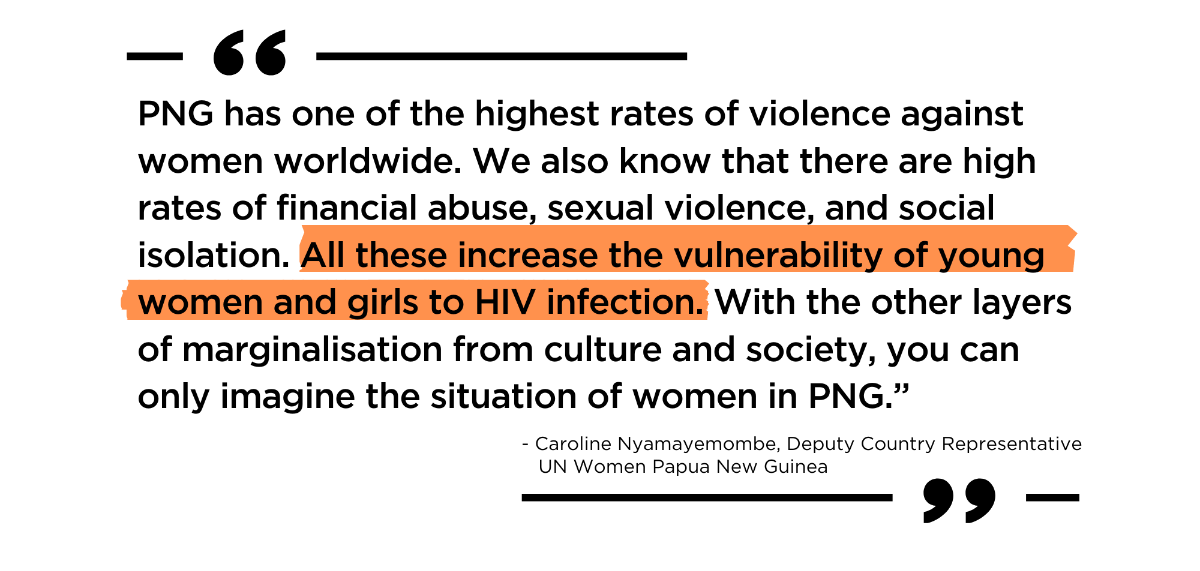
Caroline Nyamayemombe, Deputy Country Representative at UN Women Papua New Guinea, explained, “PNG has one of the highest rates of violence against women worldwide. We also know that there are high rates of financial abuse, sexual violence, and social isolation. All these increase the vulnerability of young women and girls to HIV infection. With the other layers of marginalisation from culture and society, you can only imagine the situation of women in PNG.”
Rates of HIV infection in PNG have risen dramatically in the last ten years. UNAIDS reports a 45% increase in HIV infections from 2010 to 2021[1]. Most of these cases are women. These findings mirror international statistics showing 870,000 new infections annually among women and girls worldwide. This is equivalent to three women becoming infected every four minutes.
For Cathy, a 39-year-old woman, living with HIV in Port Moresby, a gendered lack of empowerment and social isolation has compounded her hardships. She said, "I was diagnosed with HIV when I was 22. My husband died because he wouldn't seek treatment. So, I moved in with my parents and my brother's family. My brother chased me out of the house because of my HIV status and stigma."
Without family or any support services, Cathy ended up homeless. "I went through a lot. I was so emotionally and psychologically down and so traumatised. I had no place to sleep or anywhere I could go for help."
For women like Cathy, living with HIV negatively impacts nearly every aspect of their lives, from financial well-being and health to severe social stigmatisation and discrimination and personal safety. Cathy said, "They (women) can be teenagers, adolescents, or adults. If they live with HIV, they have the same issues. Sometimes women will only eat one meal a day or nothing. Sometimes they won't seek out treatment. And many women living with HIV are going through multiple forms of violence, even economic violence. You have no power; you are nothing."
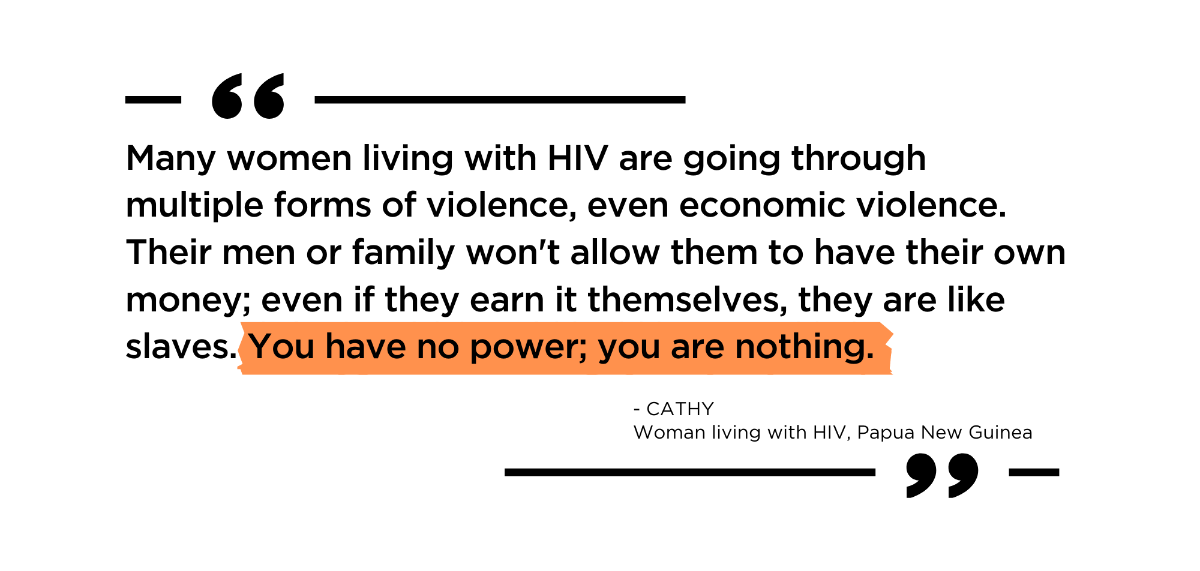
In PNG, violence against women is not only a consequence of living with HIV. There are clear and established links between gendered violence and rates of HIV transmission. Women and girls’ vulnerability to contracting HIV is increased by high rates of rape, sexual abuse, forced marriage, widow inheritance, and other harmful practices.
Zimmbodilion Mosende, Strategic Adviser at UNAIDS Papua New Guinea, explains, "If women, in general, are exposed to extreme violence, their capacity to protect themselves is less. Therefore, a high number of those women, especially those at high risk, will more and more be exposed to HIV. We must highlight this because we know that HIV can be prevented, and we have seen a steep decline worldwide in HIV cases. Still, it's not the case here in Papua New Guinea or other countries where violence against women, stigma, and discrimination are high."
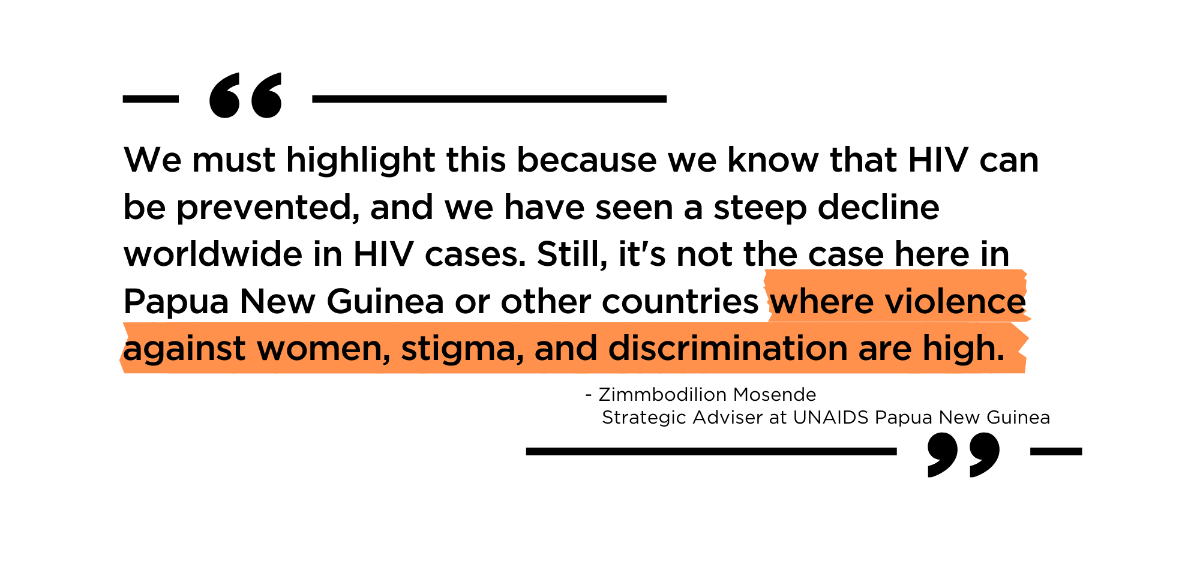
After five years of living in exile from her family, Cathy remarried and joined a women's rights organisation called WABHA, 'Women Affected by HIV and AIDS'. Cathy now advocates for the rights of other women living with the illness. "I decided to come out and speak up. We know HIV is connected to violence against women, which can come from your partner, family, or community. We also know the risk of HIV transmission is very high now, and as the trauma increases, so does the transmission rate. And this is the real life of women here."
WABHA is one of the women's rights organisations that took the stage at the 16 days of activism dialogue event in Port Moresby. Such women's rights organisations have been essential to the success of the global movement to fight HIV.
Mosende said, "Successful programmes worldwide, including HIV treatment, were borne from activism, and because of the strong voices of people living with HIV being heard by the world and by the top leaders. There's no stronger message if this comes really from the people who are affected or living with the disease."
At this dialogue-based event women living with HIV held an open and direct conversation with government leaders, service providers and other actors. Together they sought ways to better address their needs and those of women at risk. This platform for women with lived experiences of life with HIV was at the heart of the event.
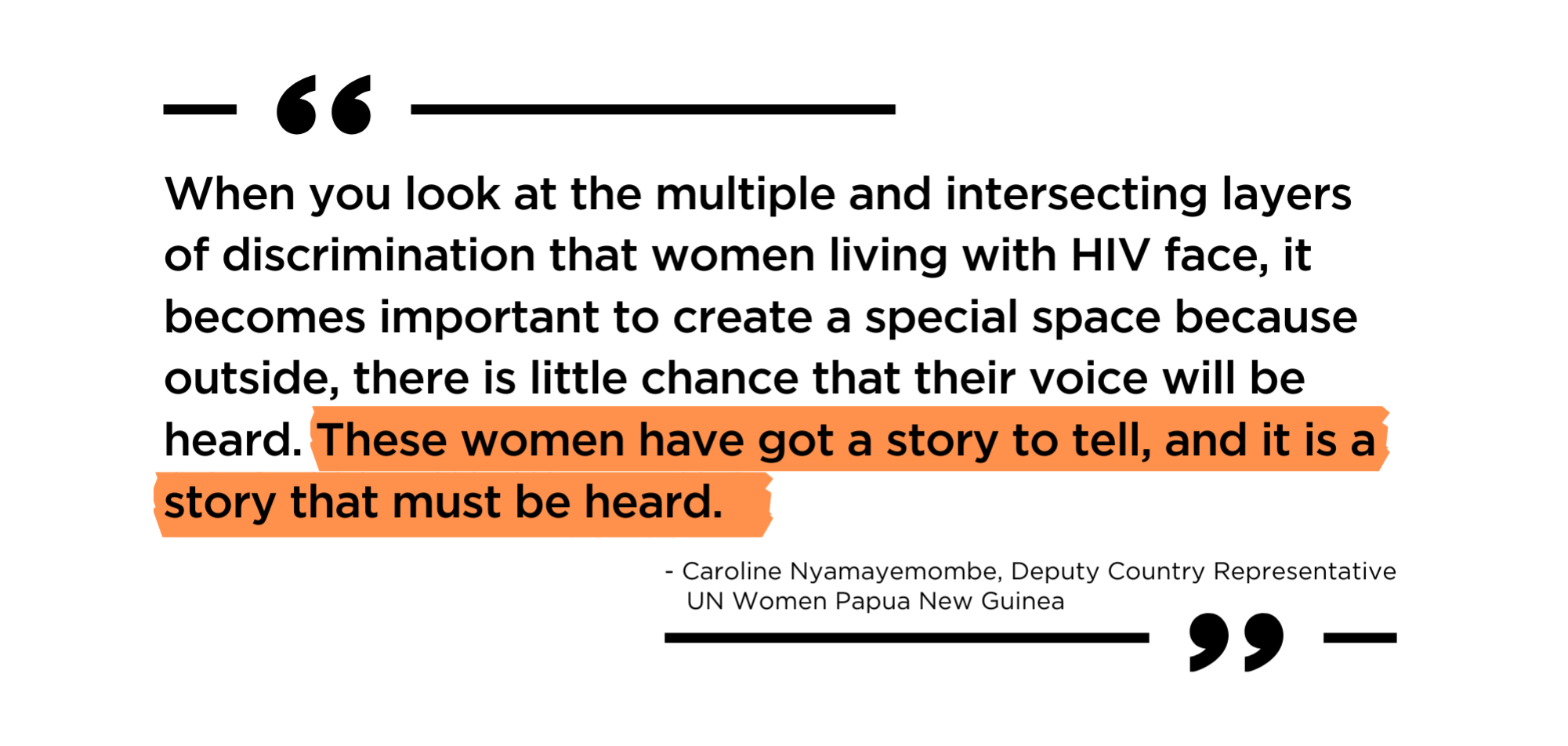
Nyamayemombe explained, "We have a patriarchal society where even discussions and decisions at the household level, at a community level, have little regard or no regard for women's opinion. So, when you look at the multiple and intersecting layers of discrimination that women living with HIV face, it becomes important to create a special space because outside, there is little chance that their voice will be heard. These women have got a story to tell, and it is a story that must be heard."
For Cathy, it was an opportunity to reassert her voice and rights and address the misinformation about life with the illness. "We must speak up. People living with HIV are normal. We can do the same things as people living without HIV. We can contribute to society. We can do what they do. We just live with treatment for the rest of our lives."
Many in attendance, including government representatives, USAID, and the EU-Spotlight Initiative, reinforced their commitment to ongoing support for women living with HIV. UN Women Papua New Guinea hopes to foster regional collaboration at a regional level to ensure that women living with HIV throughout the Pacific can live free from the threat of violence. Nyamayemombe said, "The world is very small in this part of where we are in the globe. We need each other to strengthen the support we can give to key populations. Pacific island countries should come together and become a voice to share their story with the world, increase our advocacy and accelerate government actions".
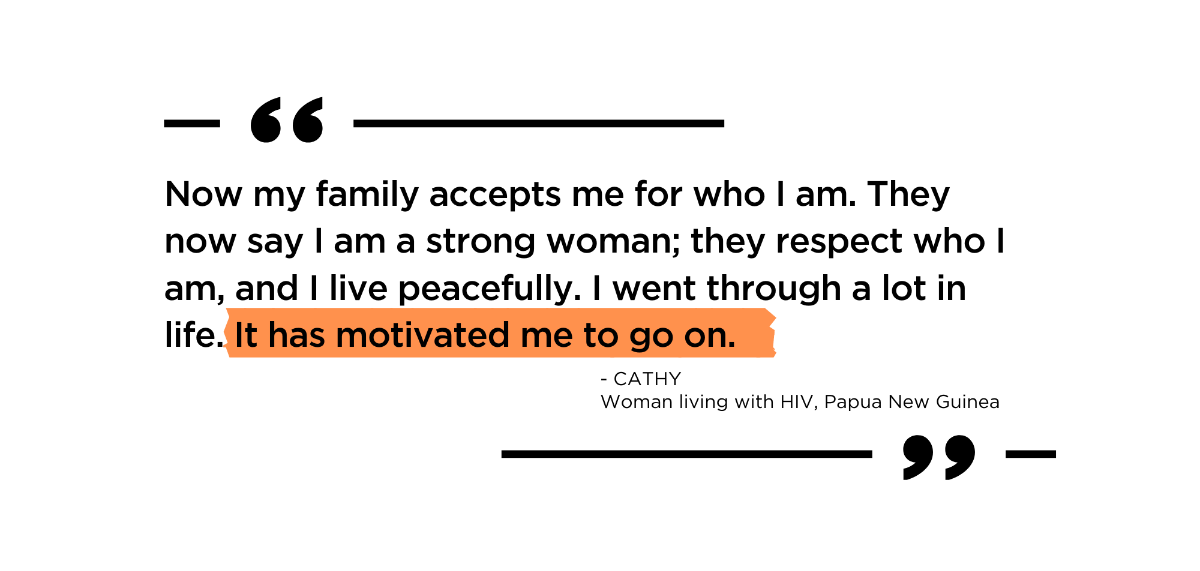
Cathy has now found peace with her family and is continuing her important work, counselling other women, and advocating to improve the lives of women living with HIV.
"Now my family accepts me for who I am. They now say I am a strong woman; they respect who I am, and I live peacefully. I went through a lot in life. It has motivated me to go on."
For more information on women living with HIV and Gender-based Violence in the Asia Pacific region, see UN Women Asia Pacific or UNAIDS.
-------------------------
[1] https://www.aidsdatahub.org/country-profiles/papua-new-guinea
https://www.aidsdatahub.org/resource/papua-new-guinea-country-snapshot-2022